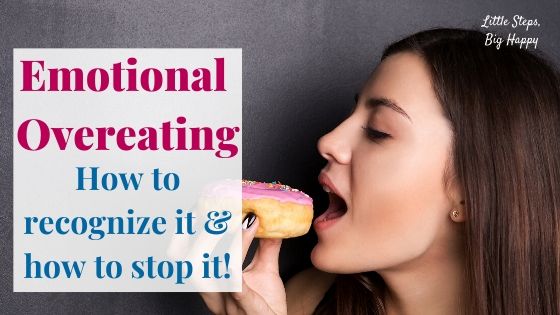Ever found yourself face first in a batch of brownies after a bad day? Yeah… me too. Emotional overeating has been the secret villain behind a lot of my weight struggles in the past.
I can’t tell you how many times I caught myself cooking pancakes at 9:30 at night when the kids had been stressing me out. And then waking up the next morning and wondering why I couldn’t seem to lose any weight.
All of my emotional overeating was putting extra weight on my body and developing an unhealthy habit of turning to food to try and solve my problems. When I finally acknowledged and started working on my emotional overeating, I was able to get my body back to a healthy weight and maintain it without feeling like I was punishing myself.
In this post, I’m going to share with you all of the things I have learned about how to recognize emotional overeating and how to get control of it.

What is emotional overeating?
Emotional overeating is when you eat food your body doesn’t physically need in response to a strong emotion. Almost any intense emotion can drive you to overeat. Especially if you have created an association between eating and feeling better.
I know I used to eat in response to a lot of different emotions. I would eat when I was stressed, angry, frustrated, sad, bored, lonely, excited, relieved, celebrating, you name it! Eating would help whatever emotion I was experiencing feel less intense.
As a mom of 3 kids with a husband who works out of town a lot, you can imagine I have a lot of feelings that I’m trying to manage on any given day.
Types of emotional overeating.
There are 2 types of emotional overeating. There is conscious emotional overeating and unconscious emotional overeating.
Conscious emotional overeating is when you know you are eating when you aren’t physically hungry. You recognize that your body doesn’t need the food, but you eat it anyway.
Unconscious emotional overeating is when you eat in response to an emotion, but you don’t know why you are eating or don’t notice that you are doing it. This is often what people are doing when they are “mindlessly snacking” or snagging bites of food as they walk past the kitchen.
Why is emotional overeating something to avoid?
Emotional overeating is important to avoid because overall it’s bad for our health. Here are some of the effects of emotional overeating.
-
Excess weight gain. Our bodies take in more food than they need. This causes us to gain excess weight. Which makes us feel bad, which leads to more emotional overeating.
-
It creates an unhealthy association with food. Every time we turn to food to help deal with our problems, we reinforce the habit that this is how we deal with our emotions. This makes it more difficult to break the cycle.
-
It masks our emotions, which prevents us from dealing with our life. Emotional overeating helps numb our emotions. It doesn’t actually solve the problems that are causing them. The problems will still be there as soon as we are done eating.
-
It’s an unhealthy habit to pass on to our children. Our children learn from the things that we do. If we are emotionally overeating, we are most likely passing this habit on to our children.
Now don’t worry. Not a single thing on this list is permanent. Every single one of them was something that I was experiencing. Once I recognized it though, I was able to start making changes for me and my family.

Tips for recognizing emotional overeating.
Just because we know that emotional overeating is bad, doesn’t guarantee that we will automatically recognize when we are doing it. If you are unfamiliar with tuning into your body’s hunger cues, emotional overeating can seem like real hunger. Here are some ways to recognize the difference.
Difference between physical hunger and emotional hunger
-
Physical hunger is a sensation in your body, not a thought about food. When I become physically hungry, I often feel it in my stomach first. When I am wanting to eat about emotions, I typically start thinking about the food first. I know when I am thinking about how good it will taste to justify eating it, it’s emotional hunger.
-
If you can forget about it or be distracted by it, it’s not physical hunger. If you wait 10 minutes from your initial desire to eat, and you realize the feeling has passed, it was probably emotional hunger. Emotional hunger comes in waves. Physical hunger is constant and increases.
-
If you are craving something specific, ex: sweet, salty, carb related, it’s not physical hunger. Emotional hunger usually presents as a craving for a specific food or taste in your mouth. If you are physically hungry, that broccoli in the fridge is looking pretty good.
-
If it’s been less than 2 hours after your last full meal, it’s probably emotional hunger. Physical hunger usually shows up 3-4 hours after your last meal. Emotional hunger can show up when you are noticeably full.
-
If it follows a strong emotion, i.e. anger, stress, sadness, guilt, it’s probably emotional hunger. Physical hunger only shows up when our bodies need fuel. Emotional hunger shows up when we are experiencing strong emotions.
How to stop emotional overeating.
These are the steps that I use to help control my emotional overeating. I am by no means perfect at it, but every day I work on it, I get a little bit better.
Become aware of when you do it.
This is one of the most important steps to controlling overeating. You can’t fix something that you are unaware you are doing.
Recognize that emotional overeating is a choice.
It can feel like a strong desire or compulsion that you have to give in to, but the reality is you are choosing to give in to it. This can be hard to accept, but it’s so helpful when you do. Once you realize you are choosing to emotionally overeat, it gives you the power and control to choose not to.
Journal your food to track your patterns and triggers.
This is how you become aware of when you are emotionally overeating. It helps show you times of the day to be aware of, or specific emotions that you are more susceptible to.
Don’t shame yourself or beat yourself up about emotionally overeating.
This applies to past or present emotional overeating. When you spend your time wondering “What’s wrong with me?” and “Why don’t I have enough willpower to stop doing this?” you are only perpetuating the cycle. You are thinking thoughts that are causing you to have more bad feelings you are going to want to overeat about.
Realize that your mistakes and struggles do not reflect poorly on you. Odds are pretty good this is a habit that you have practiced for years! It’s not going to go away overnight. And that’s OK!
Struggling with emotional overeating is merely a habit built upon a poor association with food and a lack of other skills to help you cope. Not a reflection on your willpower, strength, or desire to make changes in your life.

Create a positive attitude about your efforts to stop emotionally overeating.
Breaking that cycle of shame and doubt is going to require you to change your thinking. You need to create positive thoughts that help motivate you to keep trying and keep working towards your goal.
I like to tell myself “I am working on this. It’s not perfect today, but it’s better than yesterday.” Or when I slip up, I tell myself “Now I know this is a trigger for me to overeat. Now I can begin working on this area. I know what I need to do next.”
Exercise willpower at the grocery store.
If your house is fully stocked with “feel good” foods, it’s going to be a lot harder not to eat them to feel better about your day. Spending an hour at the grocery store avoiding the foods I typically want when I’m emotionally overeating is a lot easier than trying to avoid them when I’m feeling frustrated and they are sitting in my pantry.
Be patient!
This can be a hard step to master, but it’s really important for long-term success. Learning to control emotional overeating is definitely a marathon, not a race. You are not just trying to avoid that one bad food at the moment. You are trying to change a lifetime habit. That takes time.

Plan for the times you are going to want to emotionally overeat.
Emotionally overeating is triggered by strong emotions. Life is full of strong emotions, good and bad! There is no way that you will magically wake up tomorrow and never again have a bad day. This means you need to have a plan in place to help deal with those feelings.
You need something that breaks the cycle of automatically reaching for food to help you feel better. Here are a few ways to help you pause and decide if it’s really worth it:
-
Write in a journal about what you are feeling.
-
Take a short walk. (New to walking? I have some great tips here.)
-
Take the time to talk to a trusted friend about what you’re feeling.
-
Remind yourself that the food won’t make your problem go away.
-
Ask yourself what future you would wish you had done. Future you almost always makes the better choice.
Find ways to reduce stress in your life overall.
Working to create a life that you don’t need to feel better about is the best way to curb emotional overeating. Now, this is no quick fix. You can’t decide to make grand sweeping changes and expect things to be perfect.
What you can do is start recognizing the areas in your life that are causing you stress and start to work on them one at a time. You can also start incorporating habits into your life that reduce your daily stress level overall. Some good activities for stress relief are:
-
Daily journaling
-
Exercising regularly
-
Daily meditation
-
Self-care
-
Making time for friends and other important relationships
Conclusion
I hope you found something helpful in this article about emotional overeating. It can be a slow process, but once you break the habit and start addressing it, you will start to feel (and look) a lot better!
Do you feel like you need more support and help to get a handle on your emotional eating? I can help. I offer 1-on-1 coaching for women to help them work through the habits, thoughts, and behaviors that are holding them back from making progress with their weight loss. You can learn more about it here.
If you have any questions or advice about emotional overeating, comment below or email me at Candice@littlestepsbighappy.com. Follow me on Pinterest here for more information and support for creating healthy eating habits.
Looking for more healthy eating tips?
Healthy Eating Habits:
- How to Eat Healthy When Your Family Doesn’t: 8 Practical Tips
- How to Break Unhealthy Eating Habits in 6 Steps
- How to Stop Mindless Snacking
- Tips on How to Stop Late Night Eating
- 15 Quick and Easy Tips for Drinking More Water
- Overeating vs. Satisfied: How to Tell if You’re Eating Too Much
- 7 Tips to Manage Food Cravings and Sustain Your Weight Loss
Dieting:
- 8 Secrets to a Successful Diet
- How to Stick to Your Diet on Vacation
- Does Counting Calories Work? – The Surprising Truth!
- 3 Ways You Practice Diet Sabotage & How to Stop!
- 21 Small Diet Changes to Lose Weight for Good
Pin this for later!👇👇

Other articles you might like:




I’m a busy mom of 3 turned Health and Fitness Coach and Self Defense Instructor. I help inspire other moms to reach their health, fitness, and weight loss goals. You can usually find me chasing my kiddos around, training Brazilian Jiu-Jitsu, or sneaking away to read romance novels. About Me

